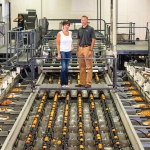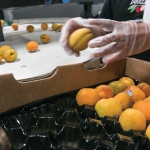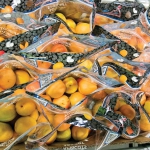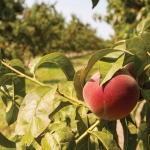Washington State may be number one in apple production, but California calls the shots when it comes to stone fruits. Last season, California expected to harvest more than 60 million packs of fresh peaches, plums, nectarines, and apricots, compared with a mere 2 million packs produced in Washington.
It’s been difficult for Washington stone fruit producers to compete in the marketplace, but Douglas Fruit Company of Pasco, Washington, has found its niche growing certified organic stone fruits.
Douglas Fruit packs a million boxes of stone fruits—including half of Washington’s fresh apricots—and is the largest stone fruit packer in the state.
Cousins Jill and David Douglas have been working together for 14 years and this year were made co-presidents, dividing up responsibilities and running the company as a team. David’s brother, John, runs the orchards, and his brother, Pete, works in sales.
David said his family grows stone fruits for several reasons. First: It helps to be diversified. When the apple industry went through a period of low returns in the late 1990s and early 2000s, stone fruits did well. Second: Having multiple crops helps keep the workforce busy all summer between cherry and apple harvests. And, third: It’s part of their legacy.
Fourth generation

John Douglas (left) and his brother Bill, not pictured, began packing their own soft fruits 30 years ago. At right, the younger John Douglas, who is in charge of Douglas Fruit Company’s orchards. (Geraldine Warner/Good Fruit Grower)
David, Peter, John, and Jill are fourth-generation fruit growers. Their grandfather was Foster Douglas, whose father-in-law, D.K. Smalling, traveled from Ohio to settle in Washington’s Yakima Valley in the 1890s and planted an apple and pear orchard. Foster took over the farm in the 1920s and expanded the operation over the next four decades to 150 acres, adding cherries, peaches, and nectarines.
Foster’s son John took over the orchards and, with his brother Bill (David’s father), expanded into Washington’s Columbia Basin. They took their stone fruits to Inland Fruit and Produce Company in Wapato, Washington, to be packed.
Just before harvest in 1983, Inland Fruit informed them it didn’t have the capacity to run their peaches. John and Bill hurriedly leased a building at the Port of Pasco and packed the few hundred boxes of peaches themselves. The following year, they built their own packing house on the site of their current facility at Taylor Flats Road.
John’s eldest daughter, Holly, who had recently earned a master’s degree in business administration from Seattle Pacific University in Washington and was selling cars, came back to the family business as sales manager.
His daughter Jill, who is three years younger, graduated from Western Washington University with a degree in sociology and criminology and went to work at a school for young male offenders in Chehalis, Washington. She was just two weeks away from beginning a master’s program in psychology when her uncle Bill called and offered her the job of general manager of Douglas Fruit.
Even though the sisters had worked for the company during the summers, they met with some skepticism from other growers at first. Ironically, that helped them succeed.
“It was challenging because you almost had to prove yourself more, being a woman in this industry and working with growers who are primarily men,” said Jill, who was 24 when she became general manager in 1989. “We worked really hard. There was no way we were going to not succeed. That drive was there. We did not want to fail.”
Holly focused on finding customers for the fruit, and they all worked on keeping them coming back for more because of its high quality.
“We were brand new,” Jill said. “Stone fruit was our forte. That’s what we started out with, and that’s what we were known for.”
Stemilt
However, they soon realized they couldn’t just pack stone fruits for three to four months and leave the facility idle for the rest of the year, so they began packing apples and now pack about 3 million boxes annually.
Their relationship with Stemilt Growers began when they started hydrocooling cherries for Stemilt’s Tri-Cities-area growers. Then, they decided to have their cherries packed at Stemilt rather than run a line themselves for just a couple of weeks. Later, Douglas supplied stone fruits and apples to Stemilt as needed, packed under the Stemilt label.
In 2004, Stemilt took over the sales and marketing of all Douglas’s fruit, though Douglas Fruit still has a small sales department that works under the Stemilt umbrella. And Douglas gave up its label to pack everything under the Stemilt brand.
“That was a big decision for us,” said David. “Once you give up your marketing department, you’re not going back. But we made the jump.”
The timing was right. As retail buyers had consolidated and grown larger, they were looking for suppliers who had the full range of fruits to offer, including apples and pears. And, after the Washington Apple Commission had to stop promoting apples in the domestic market, suppliers who were big enough to have their own merchandising and marketing staff around the country—as Stemilt had—were at an advantage.
In 2007, Douglas began transitioning all its stone fruit to organic to target a niche in the marketplace and avoid head-on competition with California. Douglas Fruit packs stone fruit for Stemilt’s growers as well as its own, though about 90 percent comes from Douglas family orchards. Their stone fruits are sold across the country and overseas. About 20 percent are exported, primarily to Taiwan, Canada, and Mexico.
The family attributes their success to being somewhat conservative in their growth and responding to the market in terms of what they grow and pack. They’ve also made a commitment to reinvest in farms and equipment. Another reason for their success is that the roles and responsibilities of the family members are in line with their skill sets, they say. Jobs have not been created for them.
David, who has a bachelor’s degree in accounting and a master’s in business administration from the University of Washington, worked for Yakima Fruit and Cold Storage in Wapato for a couple of years before joining the family business in 1999. He oversees the field staff and the financial side of the business.
Peter, a graduate of Cornell University, New York, worked in sales for Dell Computers before joining the Douglas sales force six years ago.
Replanting
The family holds annual strategic planning meetings to discuss what they and their independent growers need to do to remain competitive. Marketers provide input about where the opportunities are and where the market is oversupplied. The family also discusses the implications for the labor supply and packing house.
They replant some of their stone fruits every year.
David’s brother John (known as Little John to distinguish him from his uncle Big John) earned a degree in agribusiness from Cornell University, New York, and runs the company farms.
Many of the new stone fruit varieties they plant come from California, where most of the stone fruit breeders are based. John said it’s hard to predict how they will perform in the Pacific Northwest. For example, harvest timing might be wrong or the fruit might be smaller than in California, though generally they color better.
There’s always a succession of new stone fruit varieties, so orchards are commonly replanted within 15 years. Low-acid, white-fleshed varieties were popular for a while, but now the trend is back to the classic yellow peaches, such as O’Henry, Zee Lady, and Elegant Lady.
In Washington, though, the trees might suffer from winter injury and need to be replaced even sooner. The average lifespan of a stone fruit planting is probably 10 to 12 years. Still, it’s not such an expensive undertaking as planting an apple orchard. Trees are planted at a density of 375 to 400 per acre and are freestanding, and the ground doesn’t need to be fumigated.
David said the company is planning to add another hundred acres of peaches and nectarines.
“We feel like the demand is there, and we can effectively sell more boxes organically,” he said. “We feel we need to be of a certain size to be viable and target the national accounts.” •










Hi, interesting read about my cousins in WA?
So good to read about family working together.
Foster and Cathrine would have been proud of you all…
Just a note, your Grandpa D.K. Smalling came from Iowa, not Ohio!
From one of your Iowa Cousins.
Thanks for that note, Judy!